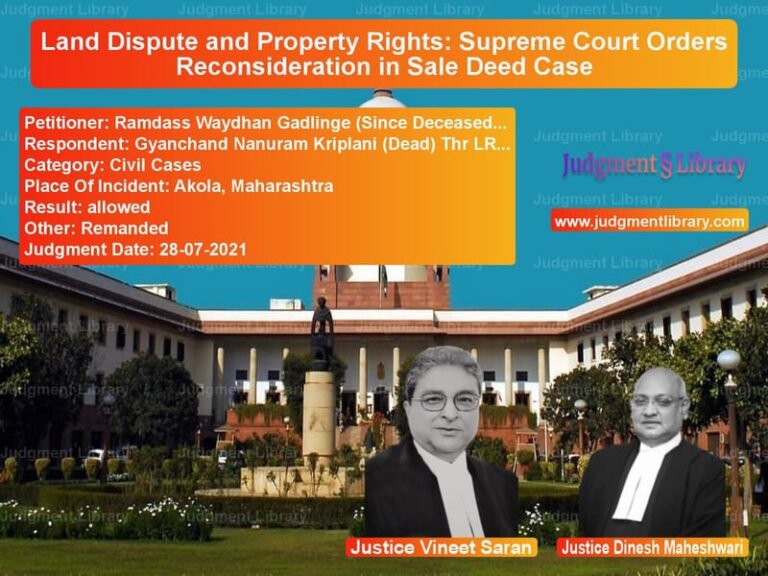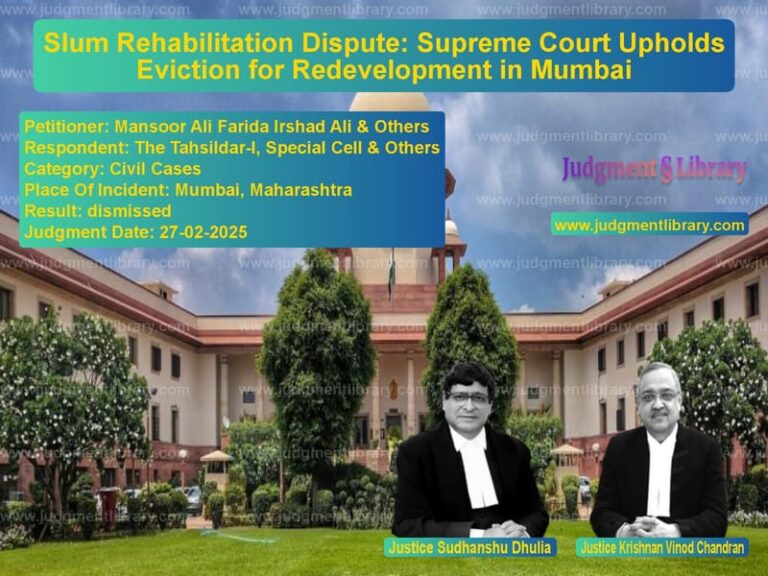Supreme Court Rules on Ownership of Alagar Hills: Temple vs. Tamil Nadu Government
On November 6, 2019, the Supreme Court of India delivered a significant judgment in the case of The Government of Tamil Nadu & Anr. vs. Arulmighu Kallalagar Thirukoil Alagar Koil & Ors.. The case revolved around a dispute over the ownership of Alagar Hills, a vast forest area located in Tamil Nadu. The Supreme Court set aside the High Court’s decision and ruled in favor of the Tamil Nadu Government, affirming that the land in question was a reserved forest under government control.
Background of the Case
The dispute began when devotees of the Arulmighu Kallalagar Temple in Madurai filed a civil suit (O.S. No. 178 of 1982) seeking a declaration that the entire forest area in Alagar Hills belonged to the temple’s deity, Sri Sundarajasami. Another suit (O.S. No. 171 of 1987) was filed by the temple administration, requesting that the Tamil Nadu government deliver possession of the land to the temple and stop any disturbance in the area.
The trial court dismissed both suits, holding that there was no evidence that the land belonged to the temple. The court accepted the government’s contention that Alagar Hills had been declared a reserved forest under a notification issued in 1883 under the Madras Forest Act, 1882.
The temple administration and devotees appealed to the Madras High Court, which overturned the trial court’s ruling. The High Court held that the notification declaring Alagar Hills as a reserved forest was invalid due to procedural lapses. Aggrieved by the decision, the Tamil Nadu government approached the Supreme Court.
Key Legal Issues
The Supreme Court examined the following key legal questions:
- Whether the land in Alagar Hills legally belonged to the Arulmighu Kallalagar Temple.
- Whether the 1883 notification under the Madras Forest Act, 1882, was valid and legally binding.
- Whether the temple had a legal right to claim possession of the forest area.
Arguments of the Appellant (Tamil Nadu Government)
The Tamil Nadu government contended that:
- Alagar Hills had been classified as a reserved forest through a legally valid notification issued in 1883.
- The temple had no documentary evidence proving ownership of the land.
- The land had always been under the control of the Forest Department.
Arguments of the Respondents (Temple & Devotees)
The temple administration and devotees argued that:
- Alagar Hills had historically belonged to the temple and was an integral part of its religious heritage.
- The government failed to transfer the land to the temple when it handed over the temple’s management.
- The 1883 notification was issued without following the proper legal procedure.
Supreme Court’s Observations
1. Validity of the 1883 Notification
The Supreme Court upheld the validity of the 1883 notification, stating:
“The notification declaring Alagar Hills as a reserved forest was issued in compliance with the law, and the necessary procedure was followed.”
The Court ruled that the land had been legally designated as a reserved forest before the temple administration’s claim.
2. Ownership of Alagar Hills
The Court found that there was no evidence proving the temple’s ownership of Alagar Hills:
“There is no documentary proof to establish that the land was ever under the ownership of the temple.”
The Court rejected the High Court’s conclusion that the government had failed to provide evidence supporting its claim.
3. Presumption of Lost Grant
The temple argued that it had been in long and continuous possession of the land, creating a presumption of a lost grant. The Supreme Court rejected this argument, stating:
“The presumption of a lost grant cannot be applied in the absence of strong documentary evidence.”
The Court ruled that occasional use of the land by the temple did not establish ownership.
4. Settlement Proposal
During the proceedings, the Court was informed of attempts to reach a settlement. The Forest Department agreed to divert 18.3032 hectares of land to facilitate the movement of devotees and religious activities. However, the temple demanded full ownership of Alagar Hills, which the government did not accept.
The Supreme Court endorsed the Forest Department’s proposal:
“The temple administration shall be allowed access to 18.3032 hectares of land for religious purposes, but no non-forest activities shall be permitted.”
Final Judgment
The Supreme Court ruled:
- The judgment of the Madras High Court was set aside.
- The Tamil Nadu government’s ownership of Alagar Hills as a reserved forest was upheld.
- The temple administration was granted access to designated land for religious activities.
- No non-forest activities were to be conducted within the allocated area.
Legal Implications of the Judgment
The ruling has significant implications for religious institutions and government land ownership:
- Reinforcement of Forest Conservation Laws: The decision strengthens legal protections for reserved forests under the Madras Forest Act.
- Limits on Religious Land Claims: The judgment clarifies that religious institutions cannot claim land without strong documentary proof.
- Judicial Recognition of Historical Notifications: The ruling affirms that century-old government notifications remain legally binding.
Conclusion
The Supreme Court’s decision in The Government of Tamil Nadu vs. Arulmighu Kallalagar Thirukoil Alagar Koil is a landmark ruling that balances religious interests with forest conservation. By upholding the validity of the 1883 notification, the judgment ensures that reserved forest land remains protected while granting religious institutions limited access for ceremonial purposes.
Petitioner Name: The Government of Tamil Nadu & Anr..Respondent Name: Arulmighu Kallalagar Thirukoil Alagar Koil & Ors..Judgment By: Justice L. Nageswara Rao, Justice Hemant Gupta.Place Of Incident: Alagar Hills, Tamil Nadu.Judgment Date: 06-11-2019.
Don’t miss out on the full details! Download the complete judgment in PDF format below and gain valuable insights instantly!
Download Judgment: The Government of Ta vs Arulmighu Kallalagar Supreme Court of India Judgment Dated 06-11-2019.pdf
Direct Downlaod Judgment: Direct downlaod this Judgment
See all petitions in Property Disputes
See all petitions in Landlord-Tenant Disputes
See all petitions in Environmental Cases
See all petitions in Judgment by L. Nageswara Rao
See all petitions in Judgment by Hemant Gupta
See all petitions in allowed
See all petitions in Quashed
See all petitions in supreme court of India judgments November 2019
See all petitions in 2019 judgments
See all posts in Civil Cases Category
See all allowed petitions in Civil Cases Category
See all Dismissed petitions in Civil Cases Category
See all partially allowed petitions in Civil Cases Category







